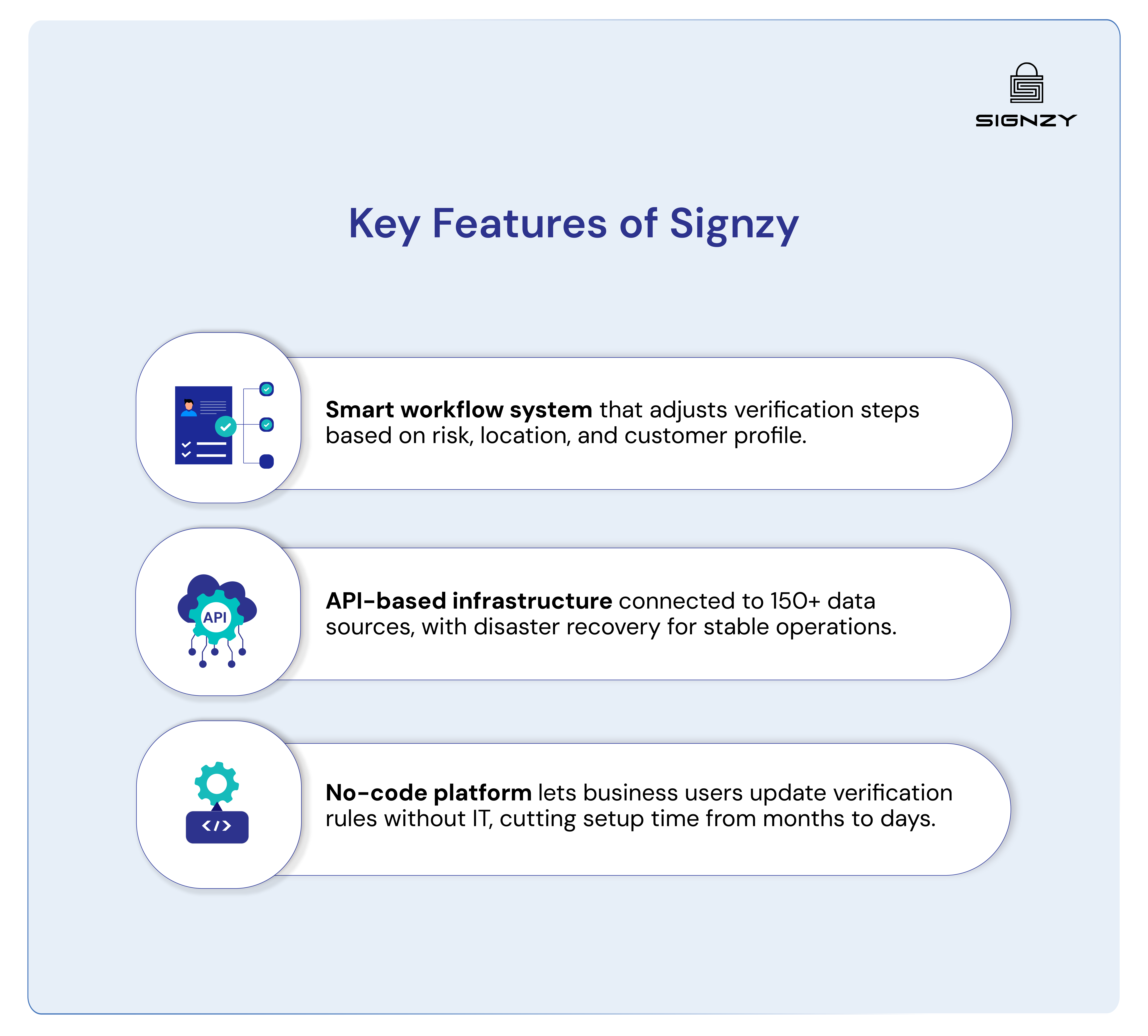Top 10 KYC Solution Providers in the USA [2026]
- KYC (Know Your Customer) is crucial for preventing fraud, ensuring regulatory compliance, and establishing trust with customers while protecting businesses from financial crimes.
- Leading providers support international verification with varying levels of coverage. Global providers like Trulioo and Signzy offer extensive coverage across hundreds of countries while adapting to regional compliance requirements.
- Modern KYC solutions employ multiple fraud prevention techniques including document authentication, biometric verification, liveness detection, behavioral analysis, and cross-checking against known fraud databases.
Look, navigating the KYC solution landscape in 2026 is overwhelming. Every vendor (ourselves included) claims to have the best technology, but what does that actually mean for your compliance program?
As someone who’s been deeply involved in developing KYC solutions, I wanted to create an honest overview of what’s available in the US market right now. Yes, our solution is on this list – but I’ve made every effort to evaluate all providers objectively based on core capabilities, pricing structure, and user feedback (thanks Reddit!).
I’m focusing on what each solution does best and where they might fall short because no single provider is perfect for every organization. Whether you’re a small fintech or an established financial institution, this guide will help you understand what’s out there and which features actually matter for your compliance needs.
Methodology
To compile this comprehensive ranking of KYC providers, our team conducted extensive research analyzing multiple factors including technical capabilities, integration flexibility, scalability, compliance framework coverage, and more.
Additionally, we incorporated user feedback from multiple sources including G2 reviews, Reddit discussions, and industry forum conversations to understand real implementation experiences beyond marketing claims.
We did not conduct direct interviews with the providers; instead, we focused on independent analysis of available information to maintain objectivity in our assessment and recommendations.
That said, let’s explore all our picks in detail.
1. Signzy
Signzy’s system architecture follows a modular approach, allowing businesses to selectively implement verification components based on specific risk factors or compliance requirements rather than forcing a one-size-fits-all solution. This means, companies can use full-fledged, end-to-end KYC suite, or if needed, Signzy allows you to automate specific components of the process (like document verification, face match, address verification, etc) you want with standalone APIs.
There’s even more: by processing verification requests at scale (up to one million queries hourly), Signzy enables financial institutions to handle peak onboarding periods without service degradation.
Key Features
- Intelligent workflow management that adapts verification pathways based on risk level, jurisdictional requirements, and customer profile characteristics
- API infrastructure supporting 150+ data sources with disaster management systems to ensure continuous operational stability
- No-code integration platform allowing business users to modify verification rules without IT involvement, reducing implementation time from months to days

Best For
Organizations of all sizes requiring flexible implementation and seamless integration. Signzy’s scalable API-based architecture supports both small businesses looking for quick deployment and enterprise-level institutions requiring robust security and high-volume processing.
2. GBG IDology
GBG IDology approaches identity verification through a distinctive multi-layered intelligence methodology that draws connections between seemingly disparate data points. Their platform synthesizes information from conventional identity documents, knowledge-based responses, and consortium data to create comprehensive identity profiles.
GBG IDology’s strength lies in its identity resolution capabilities for the North American market, where they’ve developed deep data relationships with authoritative sources.
Key Features
- ExpectID verification matrix combining multiple verification methods with configurable confidence thresholds for different risk scenarios
- Dynamic knowledge-based authentication system that generates questions based on authenticated data not available on the dark web
- Real-time identity alerts monitoring for suspicious patterns indicating synthetic identity creation or account takeover attempts
Best For
North American businesses with complex verification requirements, especially those in highly regulated industries.
3. LexisNexis Risk Solutions
LexisNexis Risk Solutions leverages one of the industry’s most comprehensive data repositories for identity verification. It achieves this by integrating public records, financial data, and proprietary risk intelligence.
The ThreatMetrix component of their platform adds behavioral biometrics and digital identity intelligence to traditional verification methods, creating a multi-dimensional view of identity that extends beyond document authentication.
Key Features
- Global risk intelligence database covering 7+ million structured profiles across 60 risk categories including sanctions, enforcement actions, and politically exposed persons
- Corporate structure analysis engine that maps beneficial ownership across complex business relationships, essential for KYB compliance
- Advanced linking technology that connects fragmented identity data across disparate sources is critical for detecting synthetic identities
Best For
Enterprise organizations conducting international operations that require comprehensive risk intelligence. It’s also useful for institutions dealing with high-stakes verification scenarios, politically exposed persons, and complex beneficial ownership structures.
4. Jumio
Jumio has pioneered an approach to identity verification that extends beyond point-in-time document authentication to create a continuous trust model. Their platform correlates identity signals across customer interactions, building a holistic view that grows more accurate over time. This shifts verification from a binary pass/fail event to an evolving confidence score that reflects accumulated trust signals.
Key Features
- Document intelligence system analyzing 3,000+ ID types from 200+ countries with automated extraction and verification of security elements
- Liveness detection utilizing 3D face mapping to prevent presentation attacks with certified compliance with ISO/IEC 30107-3 standards
- Network intelligence engine correlating verification patterns across industries to identify emerging fraud methodologies
Best For
Digital-first businesses requiring continuous verification throughout the customer lifecycle. Particularly valuable for financial services and online marketplaces, Jumio’s approach helps organizations balance security with usability across the entire customer lifecycle.
5. Trulioo
Trulioo’s platform provides standardized access to heterogeneous identity data sources through a single API, enabling consistent verification experiences regardless of customer location. Moreover, Trulioo’s strength lies in normalizing disparate verification methods across markets with vastly different identity infrastructures.
Key Features
- GlobalGateway verification network providing normalized access to 450+ data sources across 195 countries through a unified API
- Intelligent routing technology that automatically selects optimal verification sources based on document type, jurisdiction, and available data
- Person Match service uses proprietary matching algorithms to accommodate name variations and transliteration differences across languages
Best For
Global businesses operating across multiple jurisdictions with diverse regulatory requirements. It’s also Ideal for companies expanding internationally who need consistent verification experiences despite regional differences in identity infrastructure.
6. Sumsub
Sumsub has developed a verification platform that places particular emphasis on fraud prevention across the entire customer lifecycle. Their system extends beyond initial identity verification to create ongoing protection against account takeover, transaction fraud, and policy abuse.
Key Features
- A full-cycle verification system connects initial identity verification with ongoing transaction monitoring and account behavior analysis
- Advanced fraud detection incorporating 600+ behavioral data points to identify patterns associated with fraudulent operations
- Document verification engine supporting 14,000+ ID types with automated security feature authentication and tampering detection
Best For
Organizations in high-risk industries face sophisticated fraud attempts. Businesses seeking to minimize manual reviews through high automation rates will find substantial operational benefits.
7. Veriff
Veriff has developed a verification platform that combines automation with strategic human oversight to achieve high accuracy rates. Their hybrid approach applies machine learning for standard verification scenarios while routing edge cases to specialized verification experts.
This methodology enables Veriff to handle complex verification challenges that purely automated systems struggle with, including damaged documents, edge case identity scenarios, and sophisticated fraud attempts.
Key Features
- A decision intelligence system analyzes 1,000+ data points to determine the optimal verification pathway and probability of fraud risk
- Automated document processing with extraction and verification of both visible and non-visible security elements
- Cross-check verification comparing submitted information against multiple authoritative data sources to identify inconsistencies
Best For
Organizations requiring exceptional verification accuracy across challenging document types and edge cases. Particularly valuable for businesses with European operations facing stringent compliance requirements.
8. Shufti Pro
Shufti Pro supports verification across 230+ countries and 150+ languages, making it suitable for businesses with diverse international customer bases. The system combines AI-driven document processing with human augmentation for complex cases, enabling consistent performance across varying document qualities and formats.
Key Features
- Hybrid intelligence verification combining automated processing with human review for edge cases and unusual document formats
- Global language support with OCR capabilities for 150+ languages, including right-to-left and non-Latin scripts
- Comprehensive AML screening against 1,700+ global watchlists with automated ongoing monitoring and alerts
Best For
Organizations requiring verification across unusual document types or languages benefit from Shufti Pro’s comprehensive global coverage.
9. WithPersona
Persona operates on the principle that identity verification shouldn’t follow rigid templates but should bend to specific business requirements. Their platform treats verification as a design problem rather than a technical constraint, allowing organizations to craft unique customer journeys that reflect their operational realities.
Key Features
- Workflow builder that lets compliance teams construct verification journeys without touching code, adapting checks based on customer behavior patterns and risk indicators in real-time
- Integrated business-to-individual verification that maps ownership relationships and detects when multiple businesses share suspicious characteristics or controlling parties
- Fraud detection system that learns from cross-customer patterns to identify emerging attack methods before they become widespread industry problems
Best for
Organizations managing complex compliance scenarios across different customer types, particularly companies that need verification processes to evolve quickly as their business model or regulatory environment changes
10. KYC Hub
KYC Hub’s system streamlines compliance processes by transforming regulatory requirements into automated verification flows, reducing manual review needs while maintaining security standards. This approach helps organizations scale verification operations cost-effectively while ensuring consistent application of compliance policies.
Key Features
- Workflow automation engine transforming complex compliance requirements into streamlined verification processes
- Face matching technology analyzes 50+ facial data points for precise biometric comparison and liveness confirmation
- Document verification supporting 10,000+ global ID types with automated security feature authentication
Best For
Cost-conscious organizations seek to maximize operational efficiency through automation. It’s best suited for businesses with structured compliance requirements that can be systematized through rules-based workflows. Companies experiencing rapid growth or volume fluctuations will benefit from KYC Hub’s scalable automation capabilities.
How to Choose the Right KYC Provider
The right solution needs to align with your operational workflow, customer journey expectations, and compliance obligations.
While requirements vary from organization to organization, if you are a bit unclear, consider these seven key factors:
- Verification requirements (document types, countries covered, compliance frameworks)
- Technical compatibility (API options, integration complexity)
- Scalability (growth capacity, volume handling)
- Cost structure (per-verification vs. subscription)
- Implementation Timeline
- Support availability
- User experience impact
Match these factors against your specific business context rather than simply following market trends.
For example, if you’re a rapidly growing fintech with international expansion plans, Signzy’s capability to handle verification across 240+ countries through a single API integration would streamline your regulatory compliance as you enter new markets.
Similarly, if your organization faces tight IT resource constraints, Signzy’s no-code implementation approach could reduce your deployment timeline from months to weeks while still meeting compliance requirements.
To know more about how Signzy can help, book a demo today.
FAQ
How much do KYC solutions typically cost?
Can KYC solutions be integrated with existing business systems?
What documentation do businesses need to prepare before implementing KYC?
How do KYC solutions impact customer experience?

Agrima Dwivedi
Agrima is an Associate Product Marketer at Signzy, currently working in the B2B fintech space. She brings over two years of experience in copywriting and content writing, which laid the foundation for product marketing. Today, she leverages both creative and strategic skills to drive go-to-market efforts and build user-focused marketing strategies.

![Top 10 KYC Solution Providers in the USA [2026]](https://cdn.sanity.io/images/blrzl70g/production/008b1ea8636a5a1febcd10331269d51c5c29090e-3985x933.jpg)
